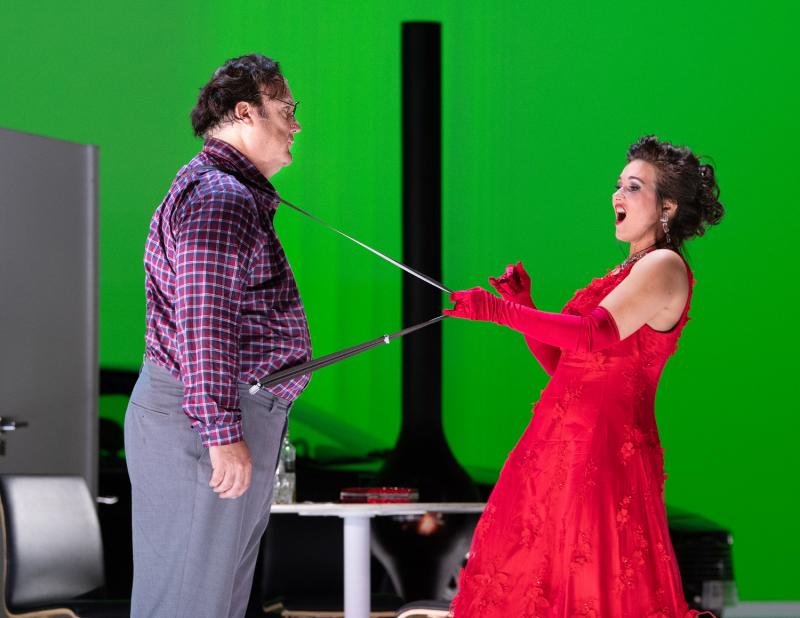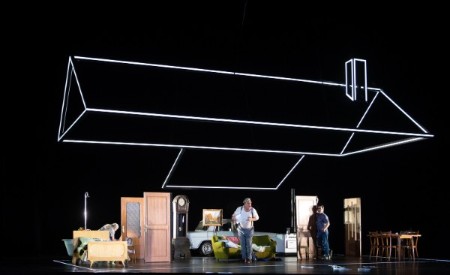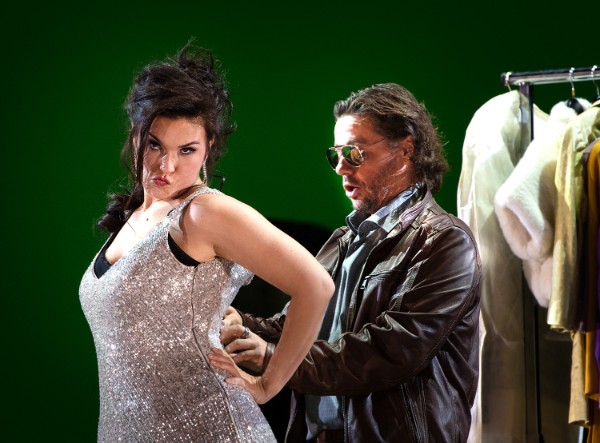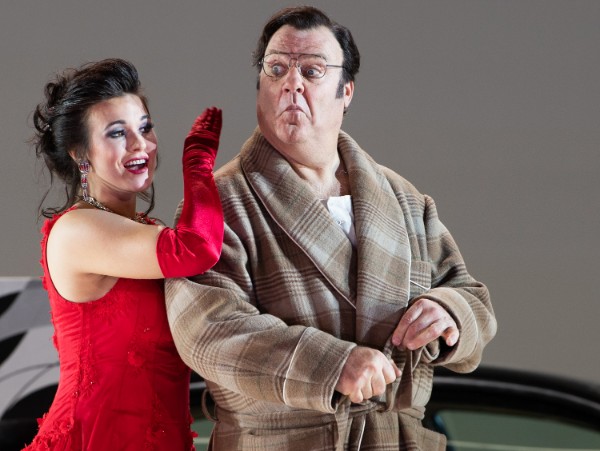Don Pasquale, Royal Opera review - fun and frolics in stylish new production | reviews, news & interviews
Don Pasquale, Royal Opera review - fun and frolics in stylish new production
Don Pasquale, Royal Opera review - fun and frolics in stylish new production
Bryn Terfel shines but Olga Peretyatko soars in Donizetti's charming comedy

Venetian director Damiano Michieletto’s new Royal Opera production of Donizetti’s Don Pasquale is a clever and entertaining mix of old and new.
It would be striking if you could get a proper look at it, but the sheer brightness of the lighting - inconveniently placed between the stage and the supertitles - is a tad strenuous on the eye. You’d be forgiven for thinking that’s the era this production’s set in, but set designer Paola Fantin’s expertly curated period furniture serves to let the audience know quite how old fashioned the ageing Don Pasquale’s home interiors are, as made evident by the set change at the end of the first act, which transforms the stage to a thoroughly modern photography studio, with a green screen and live video projection.  By far the biggest name in the cast, Bryn Terfel is commanding yet also endearing as the buffoonish Don Pasquale, though it was Russian-German soprano Olga Peretyatko who really stole the show, making her Royal Opera House debut in the role of Norina, who’s betrothed to Don Pasquale’s nephew, Ernesto. Don Pasquale refuses to see the pair married given Norina’s lowly status, so he decides he will marry himself, and, despite his advanced years, produce an heir.
By far the biggest name in the cast, Bryn Terfel is commanding yet also endearing as the buffoonish Don Pasquale, though it was Russian-German soprano Olga Peretyatko who really stole the show, making her Royal Opera House debut in the role of Norina, who’s betrothed to Don Pasquale’s nephew, Ernesto. Don Pasquale refuses to see the pair married given Norina’s lowly status, so he decides he will marry himself, and, despite his advanced years, produce an heir.
We first meet Norina as a wardrobe assistant, dressing a glamorous couple for a photoshoot. When approached by Dr Malatesta - impressively sung here by Austrian baritone Markus Werba - she transforms her outfit from a plain demin dress to a stunnig sequined gown, illustrating the duplicity of the role, as Malatesta conveys to her his plan that she pretends to be his sister, and seduce the stupid old man. Norina vows to make life so difficult for Don Pasquale that he’ll eventually allow her and Ernesto to marry, Peretyatko and Werba’s duetting here (pictured below) was playful and cheeky.  As the curtain comes up on Act III, it reveals a dozing Don Pasquale back in his house, which is now devoid of all the old fashioned furniture. The chorus, dressed as builders and removal people, soon start to fill it with the expensive, up to date items purchased by Don Pasquale’s new bride. As they all hand him bills, it harks back to an earlier scene when several small boys came on stage, presumable Pasquale’s imagined heirs, and handed him hand-drawn pictures. How different is Don Pasquale’s reality to the marital bliss he’d dreamt of! Peretyatko now wears a dazzling red gown, a stark contrast to Terfel’s dowdy dressing gown and pyjamas.
As the curtain comes up on Act III, it reveals a dozing Don Pasquale back in his house, which is now devoid of all the old fashioned furniture. The chorus, dressed as builders and removal people, soon start to fill it with the expensive, up to date items purchased by Don Pasquale’s new bride. As they all hand him bills, it harks back to an earlier scene when several small boys came on stage, presumable Pasquale’s imagined heirs, and handed him hand-drawn pictures. How different is Don Pasquale’s reality to the marital bliss he’d dreamt of! Peretyatko now wears a dazzling red gown, a stark contrast to Terfel’s dowdy dressing gown and pyjamas.
In fact, the costumes are great, that of Don Pasquale’s nephew Ernesto possibly excepted. His blue-grey polo shirt makes the character look like he’s going to work in a suburban call centre on dress down Friday. Romanian tenor Ion Hotea’s singing though was by no means drab, his crisp, light voice giving a tenderness to the lovelorn, and slightly naive Ernesto.  As Norina and Ernesto meet in the garden for a ‘secret’ tryst (they’ve left a note - or in this case a message on a smartphone - for Don Pasqaule to see) we’re back in the studio with the green screen, the two lovers live projected onto a background of forest trees. This cleverly highlights the voyeuristic nature of the scene, not to mention allowing the audience to see clearly some fabulous facial expressions from Peretyatko. Her duet here with Hotea was the most impressive ensemble singing of the night. as they sang with a rich blend and great synergy between characters.
As Norina and Ernesto meet in the garden for a ‘secret’ tryst (they’ve left a note - or in this case a message on a smartphone - for Don Pasqaule to see) we’re back in the studio with the green screen, the two lovers live projected onto a background of forest trees. This cleverly highlights the voyeuristic nature of the scene, not to mention allowing the audience to see clearly some fabulous facial expressions from Peretyatko. Her duet here with Hotea was the most impressive ensemble singing of the night. as they sang with a rich blend and great synergy between characters.
From the pit, the Orchestra of the Royal Opera House conducted by Evelino Pidó gave a perky and pithy backdrop to all the on stage action with vibrant brass and buoyant woodwind. Despite the vast theatre, the sound was quite an intimate one, and a fitting reminder of the human emotion and kindness behind this farcical tale.
rating
Explore topics
Share this article
The future of Arts Journalism
You can stop theartsdesk.com closing!
We urgently need financing to survive. Our fundraising drive has thus far raised £49,000 but we need to reach £100,000 or we will be forced to close. Please contribute here: https://gofund.me/c3f6033d
And if you can forward this information to anyone who might assist, we’d be grateful.

Subscribe to theartsdesk.com
Thank you for continuing to read our work on theartsdesk.com. For unlimited access to every article in its entirety, including our archive of more than 15,000 pieces, we're asking for £5 per month or £40 per year. We feel it's a very good deal, and hope you do too.
To take a subscription now simply click here.
And if you're looking for that extra gift for a friend or family member, why not treat them to a theartsdesk.com gift subscription?
more Opera
 Káťa Kabanová, Glyndebourne review - emotional concentration in a salle modulable
Janáček superbly done through or in spite of the symbolism
Káťa Kabanová, Glyndebourne review - emotional concentration in a salle modulable
Janáček superbly done through or in spite of the symbolism
 Buxton International Festival 2025 review - a lavish offering of smaller-scale work
Allison Cook stands out in a fascinating integrated double bill of Bernstein and Poulenc
Buxton International Festival 2025 review - a lavish offering of smaller-scale work
Allison Cook stands out in a fascinating integrated double bill of Bernstein and Poulenc
 Tosca, Clonter Opera review - beauty and integrity in miniature
Happy surprises and a convincing interpretation of Puccini for today
Tosca, Clonter Opera review - beauty and integrity in miniature
Happy surprises and a convincing interpretation of Puccini for today
 Hamlet, Buxton International Festival review - how to re-imagine re-imagined Shakespeare
Music comes first in very 19th century, very Romantic, very French operatic creation
Hamlet, Buxton International Festival review - how to re-imagine re-imagined Shakespeare
Music comes first in very 19th century, very Romantic, very French operatic creation
 Falstaff, Glyndebourne review - knockabout and nostalgia in postwar Windsor
A fat knight to remember, and snappy stagecraft, overcome some tedious waits
Falstaff, Glyndebourne review - knockabout and nostalgia in postwar Windsor
A fat knight to remember, and snappy stagecraft, overcome some tedious waits
 Salome, LSO, Pappano, Barbican review - a partnership in a million
Asmik Grigorian is vocal perfection in league with a great conductor and orchestra
Salome, LSO, Pappano, Barbican review - a partnership in a million
Asmik Grigorian is vocal perfection in league with a great conductor and orchestra
 Semele, Royal Opera review - unholy smoke
Style comes and goes in a justifiably dark treatment of Handelian myth
Semele, Royal Opera review - unholy smoke
Style comes and goes in a justifiably dark treatment of Handelian myth
 Le nozze di Figaro, Glyndebourne review - perceptive humanity in period setting
Mostly glorious cast, sharp ideas, fussy conducting
Le nozze di Figaro, Glyndebourne review - perceptive humanity in period setting
Mostly glorious cast, sharp ideas, fussy conducting
 Fidelio, Garsington Opera review - a battle of sunshine and shadows
Intimacy yields to spectacle as Beethoven's light of freedom triumphs
Fidelio, Garsington Opera review - a battle of sunshine and shadows
Intimacy yields to spectacle as Beethoven's light of freedom triumphs
 Dangerous Matter, RNCM, Manchester review - opera meets science in an 18th century tale
Big doses of history and didaction are injected into 50 minutes of music theatre
Dangerous Matter, RNCM, Manchester review - opera meets science in an 18th century tale
Big doses of history and didaction are injected into 50 minutes of music theatre
 Mazeppa, Grange Park Opera review - a gripping reassessment
Unbalanced drama with a powerful core, uninhibitedly staged
Mazeppa, Grange Park Opera review - a gripping reassessment
Unbalanced drama with a powerful core, uninhibitedly staged
 Saul, Glyndebourne review - playful, visually ravishing descent into darkness
Ten years after it first opened Barrie Kosky's production still packs a hefty punch
Saul, Glyndebourne review - playful, visually ravishing descent into darkness
Ten years after it first opened Barrie Kosky's production still packs a hefty punch

Add comment